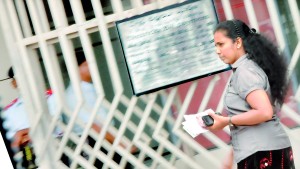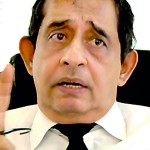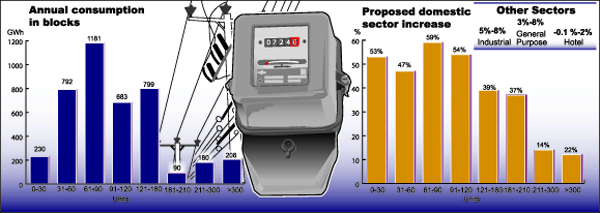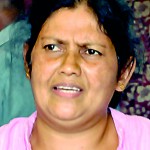News
Light bill won’t be light for the poor
View(s):Low-income groups hit hardest if CEB’s regressive tariff system comes into force; consumers call on Govt. to step in and stop it
By Chamal Weerakkody
The soon-to-be implemented electricity tariff hikes will hit the low-income group people the hardest, the Sunday Times learns.
According to the proposed rates, households that consume less than 30 units a month will be paying an additional 53 per cent over their bill and those using between 31 and 60 units will see their bills going up by 47 per cent more.

Soon in for a rude shock: A Consumer heads to the electricity payment centre at CEB headquarters in Colombo. Pic by Mangala Weerasekera
Consumers using between 61 and 90 units will have to pay 59 per cent more and those using between 91 and 120 units will be paying 54 per cent more. But the burden on households using between 211 and 300 units will only be a 14 per cent.
Touted as a cost-reflective tariff system, the new electricity tariff proposal seeks to minimise the losses the Ceylon Electricity Board (CEB) has been suffering in the past two decades.
The new rates are being discussed by the Public Utilities Commission (PUC) which has called upon the general public to come before it and express their views. Its sittings will end on April 4 after the Commission reviews suggestions from stakeholders, including consumers, CEB engineers’ unions and private power suppliers.
According to CEB statistics, 75 per cent of its five million domestic consumers are those who consume between 1 to 90 units of electricity. Thus the CEB has felt a substantial increase in the electricity bills of those who come within this range will help raise the revenue and minimise the losses.

Explaining the country’s energy crisis: PUC Chairman Jayatissa de Costa
But most consumers saw the new method as unfair and regressive and said it was not the right time to increase the rates when they were finding it difficult to cope with the spiralling cost of living.
Kulani Manahari, a student from Veyangoda, said students from poverty-stricken homes and the middle class would be the worst affected if the new tariff system was implemented.
“Schoolchildren study at night because during the day time, they are either in schools or in tuition classes. So this is a big blow to students studying for examinations,” Ms. Manahari said.
She pointed out that electricity played a major role in education today with students using internet at home and watching education programmes on television and listening to radio.
Endorsing Ms. Manahari’s views was a teacher from Mirigama. She said many households were struggling to pay the electricity bill even at the present rate and the proposed hikes would only add to their burden. She pointed out that many low- and middle-income households were trying to keep their electricity consumption within 90 units — with some parents in rural areas using only one light bulb in the night to attend to their chores and enable their children to study.
Nimali Adhikari, who runs a fruit juice outlet in Colombo said she was afraid that her business would not be able to cushion anymore increase in the electricity bill. She said electricity rate increases usually had their chain reaction and therefore a price hike in many goods and services was inevitable.

Nimali Adhikari: The hike will hit her fruit juice business
Expressing similar concerns was three-wheeler driver Nilantha Perera. He said if the Government failed to step in and stop the tariff hike, three-wheeler drivers like him would have no option but to increase the fares.

Nilantha Perera: Three wheeler driver says no option but to increase fares
Dismissing the PUC’s public consultation process as a meaningless exercise, Mr. Perera said the Government and other responsible parties should find solutions to the existing energy crisis without imposing increased tariffs on the suffering masses.
PUC Chairman Jayatissa de Costa said the energy crisis in a country with fewer energy-producing resources was highly complicated with the state being compelled to import fuel and machinery to provide an uninterrupted supply of electricity.
He said the country’s demand for electricity could not be met by hydropower generation alone and it needed to be supplemented by other means of energy generation.
Dr. Costa said the ideal alternative energy source would be coal as coal power generation was cheaper than thermal power generation which required fossil fuel.
He said a solution to the crisis would be power cuts or the adoption of “the time-of-the-day tariff,” a method by which a five per cent reduction in power consumption during peak hours would result in a 50 per cent reduction in the monthly bill.
A CEB engineer said the CEB had been incurring large losses in the past 20 years because it bought power from private suppliers at high price and distributed it at a loss. He said a way out could be the nationalisation of the private power plants and allowing the CEB to produce and distribute power.
Follow @timesonlinelk
comments powered by Disqus



















